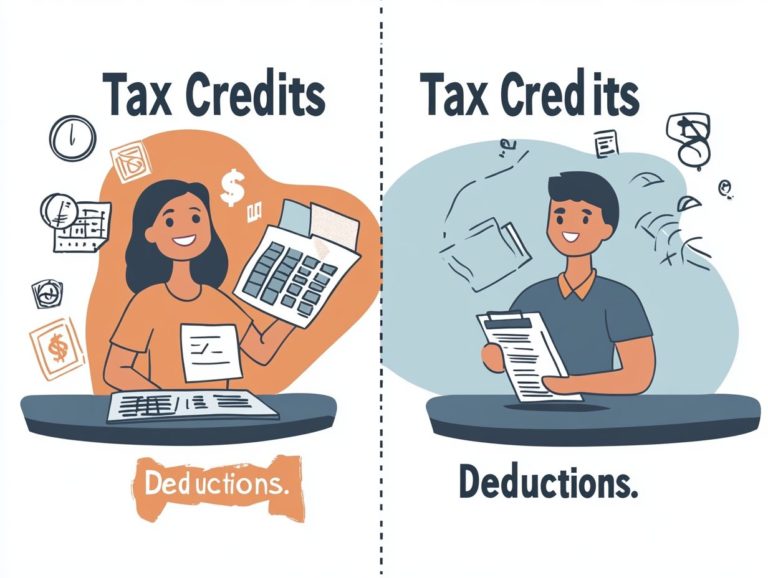10 Strategies for Managing Freelance Invoices Efficiently
Managing invoices can be one of the most challenging aspects of freelancing, yet it is essential for maintaining a healthy cash flow.
This article presents ten tips to help freelancers effectively manage their invoices, including the importance of establishing clear payment terms and utilizing professional invoicing software.
Contents
- Key Takeaways:
- 1. Set Clear Payment Terms and Policies
- 2. Use a Professional Invoicing Software
- 3. Create Templates for Different Types of Invoices
- 4. Include All Relevant Information on Invoices
- 5. Set Up Automatic Reminders for Overdue Invoices
- 6. Offer Incentives for Early Payment
- 7. Keep Track of Invoice Numbers and Dates
- 8. Utilize Online Payment Options
- 9. Send Invoices in a Timely Manner to Improve Invoice Handling
- 10. Follow Up on Unpaid Invoices
- What Are the Benefits of Efficient Invoicing for Freelancers?
- What Are Some Common Challenges with Invoicing for Freelancers?
- How Can Freelancers Ensure Accurate Invoicing?
- What Are Some Tips for Managing Invoices for Multiple Clients?
- How Can Freelancers Keep Track of Their Invoices and Payments?
- What Are Some Common Mistakes to Avoid When Invoicing as a Freelancer?
- Frequently Asked Questions
- What are the top 10 strategies for managing freelance invoices efficiently?
- How can setting clear payment terms benefit both freelancers and clients?
- Why is it important to use a professional invoicing system for freelance work, particularly for small businesses?
- How can automatic invoice reminders and invoice approval processes help with timely payments?
- What are the benefits of using online invoice payment methods for freelance invoices?
- How often should freelancers review and update their invoicing guidelines and invoice structures?
Key Takeaways:
- Set clear and specific payment terms and policies to avoid confusion and ensure timely payments from clients.
- Utilize professional invoicing software to streamline the invoicing process and keep track of invoices and payments.
- Offer incentives for early payment and set up automatic reminders for overdue invoices to encourage timely payments and avoid late fees.
1. Set Clear Payment Terms and Policies
Clearly defined payment terms and policies are essential for small businesses, as they help manage money better and mitigate the risk of issues arising during the invoicing process. This includes understanding accounts payable (money you owe to others) and accounts receivable (money others owe you). This clarity not only enhances client relations but also improves invoice management practices.
Ultimately, this leads to timely client payments and greater cash flow stability.
Some key benefits of well-defined payment terms and policies for small businesses include:
Setting Due Dates: By specifying exact due dates for invoices and outlining any applicable late fees, small businesses establish clear expectations for clients. This approach helps reduce late payments and minimizes the occurrence of delayed financial transactions.
Encouraging Timely Payments: Implementing best practices in invoice management, such as sending reminders before due dates and engaging in open discussions about payment terms, can streamline accounts receivable processes for small businesses.
Supporting Cash Flow Management: Clearly defined policies contribute to overall cash flow management, enabling small businesses to better prepare for expenses and seize growth opportunities.
2. Use a Professional Invoicing Software
The importance of professional invoicing software for small businesses lies in its ability to streamline the invoicing process, automate the creation of invoices, and enhance overall efficiency. Automated invoicing and tracking significantly reduce errors.
Customization options enable businesses to tailor invoices to their branding, making them more professional and recognizable. Integration with existing accounting systems simplifies financial management by ensuring that all data is synchronized for accurate reporting.
Effective management of invoice dispatch and tracking eliminates delays in payment processing, thereby improving cash flow and reducing the effort required to follow up on overdue invoices.
This proactive approach not only saves time but also fosters positive relationships with clients by providing a modern and efficient billing process.
3. Create Templates for Different Types of Invoices
Creating templates for different types of invoices is an effective way for small businesses to maintain uniformity and professionalism in their invoicing process. Customized invoice templates tailored to specific services or projects ensure that essential elements, such as payment terms and invoice descriptions, are consistently included.
This practice enhances compliance and reduces the risk of errors that could lead to payment delays.
For instance, a service-based business may require an invoice template that breaks down hours worked against the hourly rate, while a product-based business might need a template that itemizes goods sold, complete with quantities and unit prices.
Multi-phase projects can benefit from invoice templates that reflect the agreed-upon phases, keeping clients informed about the work completed up to that point. Customized templates enable businesses to effectively meet the varied requirements of different customers.
Take control of your invoicing today!
4. Include All Relevant Information on Invoices
Including all relevant information on invoices is essential for small businesses. This practice helps avoid errors and ensures effective communication with clients.
Important elements of an invoice, such as detailed descriptions, payment terms, and contact information, facilitate the invoicing process and increase the likelihood of timely payment.
Unique invoice numbers, due dates, and itemized lists of services rendered or products sold greatly enhance transparency. Clearly presenting this information builds trust and reduces the chances of misunderstandings.
Effective invoices serve as payment requests and as vital communication tools, ensuring clients understand their obligations. This clarity aids in invoice tracking and helps resolve disputes more easily.
Including recurring billing details for ongoing services simplifies interactions and reinforces professionalism and organization.
5. Set Up Automatic Reminders for Overdue Invoices
Automatic reminders for overdue invoices are a helpful step that small businesses can take. They enhance cash flow management (keeping track of money in and out) and minimize late payments.
Automated invoicing features enable businesses to send reminders about payment deadlines, improving overall invoice tracking.
This technology simplifies invoice management and enhances communication by reducing confusion regarding payment due dates. For the best results, carefully consider the timing and frequency of reminders.
An effective strategy involves sending an initial reminder one week before the due date, followed by another message one or two days prior. This approach keeps the invoice in the client’s awareness without being overly aggressive.
A courteous follow-up one week after the payment due date can help identify any issues while encouraging prompt payment.
6. Offer Incentives for Early Payment
Incentivizing early payment can significantly boost cash flow stability for small businesses. It encourages customers to pay on time and improves overall financial operations.
Early payment discounts create a mutually beneficial scenario for both parties, and the same applies to bonuses for early payment.
These incentives foster goodwill and loyalty. When customers feel appreciated for their promptness, they are more likely to reciprocate.
Additionally, these strategies streamline the invoicing process, reducing administrative burdens and minimizing the need for late payment follow-ups.
As a result, small businesses can maintain a more consistent cash flow. Ultimately, these methods foster trust and cooperation, leading to long-term partnerships and repeat business.
7. Keep Track of Invoice Numbers and Dates
Tracking invoice numbers and dates is crucial for small businesses. It improves record-keeping and helps monitor payment statuses.
Organized information enables businesses to determine when to follow up and be alerted to potential payment delays.
This organization minimizes errors and inaccuracies during billing, which can lead to misunderstandings with clients or cash flow issues.
Well-organized records enhance the accuracy of financial reporting, aiding in decision-making and planning.
To effectively track invoice numbers and dates, small businesses should consider utilizing digital invoicing solutions. These tools make tracking and retrieving invoices easier while offering automation features to reduce manual data entry errors.
Conducting regular audits of invoicing procedures and using cloud storage to keep records accessible and up to date are also essential practices.
Overall, well-organized invoice records provide businesses with a clear overview of their finances, supporting their growth.
8. Utilize Online Payment Options
By utilizing online payment options for invoicing, small businesses can offer their customers various easy-to-use payment methods. This facilitates the payment process and enhances customer satisfaction. It also improves cash flow management through automated accounting systems.
Providing a range of electronic payment options significantly reduces the time it takes to receive payments. This leads to a more efficient transaction process. When businesses offer choices such as credit cards, e-wallets, or bank transfers, they eliminate potential obstacles that could delay payment.
This results in faster invoice reconciliation, reducing both administrative effort and the risk of errors. Companies can spend less time on paperwork and focus more on their core competencies, ultimately improving productivity and providing a clearer overview of their financial condition.
9. Send Invoices in a Timely Manner to Improve Invoice Handling
Sending invoices promptly is essential for small businesses to manage cash flow and ensure compliance with payment terms agreed upon with clients. Timely invoicing keeps clients informed of their obligations, enabling them to fulfill them.
Establishing clear invoice deadlines is crucial for maintaining strong client relationships and ensuring timely payments. Specify a due date on all invoices and send automated reminders to clients as the deadline approaches.
Consistent invoicing fosters a culture of timely payments, increasing the likelihood that clients will pay on time. Failing to send invoices promptly can lead to cash flow issues, missed opportunities for reinvestment, and a damaged reputation.
Send invoices on time to sidestep these hurdles and boost your financial health!
10. Follow Up on Unpaid Invoices
Following up on unpaid invoices is a crucial aspect of managing invoices for small businesses. To maintain a healthy cash flow, it’s important to remind clients of their payment obligations at the appropriate times and in the right manner.
Establishing a follow-up schedule can help clients prioritize their payments effectively. Use a friendly yet firm tone in communications to ensure that messages are received positively, increasing the likelihood of a prompt response.
Knowing the best times to reach clients can enhance engagement. Typically, contacting clients between Tuesday and Thursday during business hours works best.
This outreach should include information about the amounts owed and how unpaid invoices can impact broader financial metrics, such as cash flow and liquidity ratios, which measure how easily a business can pay its debts. Educating clients on these implications helps them recognize the importance of reconciling invoices.
What Are the Benefits of Efficient Invoicing for Freelancers?
Efficient invoicing enables freelancers to better manage cash flow, ensuring timely payments from clients. The advantages of effective invoicing include reduced administrative efforts, fewer invoice errors, and improved client relationships.
This increased efficiency not only saves time—allowing freelancers to focus more on their core work—but also positively affects cash flow. For instance, an architect was able to take on two additional projects after reducing their invoicing time from 10 hours to just 2 hours per week by utilizing online billing software.
Fast and consistent invoicing leads to quicker client payments. Most clients appreciate clarity and professionalism in billing. These benefits contribute to greater client satisfaction; for example, an accountant reported a significant rise in repeat projects from pleased clients after adopting an organized invoicing system.
Ultimately, efficient invoicing helps freelancers build successful and sustainable careers.
What Are Some Common Challenges with Invoicing for Freelancers?
Freelancers often face several challenges with invoicing, including invoice mistakes, late payments, and cash flow instability. These issues can significantly hinder the growth of a freelancer’s business and negatively impact their financial health.
Inconsistent, inaccurate, or incorrect invoices can lead to misunderstandings between freelancers and their clients. This can cause frustration and potentially damage their relationships. Late payments make it difficult for freelancers to meet their financial obligations, highlighting the necessity for better ways to handle invoices.
Invoicing software can help by automating calculations of time and costs, enhancing accuracy and minimizing the risk of human error. Payment tracking features enable freelancers to identify late clients and remind them that payment is due, ensuring proper record keeping. Freelancers should set clear payment terms at the beginning of each contract and regularly follow up to ensure timely payments.
By implementing effective invoicing practices through software solutions, freelancers can boost their cash flow and take control of their finances!
How Can Freelancers Ensure Accurate Invoicing?
Accurate invoicing is essential for freelancers to maintain their credibility and cultivate strong relationships with clients. By following invoicing best practices and utilizing invoice software, freelancers can minimize errors and delays in payment.
These tools often feature customizable templates that streamline the invoicing process and automated reminders to help prevent missed deadlines. For freelancers, integrating invoicing software with their accounting tools ensures a consistent flow of information and enhances financial visibility.
It is crucial for freelancers to thoroughly review every detail they enter—such as the client’s name and address, services rendered, and payment terms—before sending invoices. This diligence helps reduce the likelihood of disputes and strengthens the freelancer-client relationship.
What Are Some Tips for Managing Invoices for Multiple Clients?
Invoicing multiple clients can be challenging for freelancers; however, effective tools and strategies can streamline the invoice creation process and ensure timely payments from customers while addressing invoice delays.
One valuable tip is to select specialized invoicing software that allows for customization based on client preferences. This gives invoices a more professional appearance and improves overall invoice communication. Integrating time-tracking applications is another beneficial approach, enabling accurate capture of billable hours. This integration simplifies the invoicing process and minimizes the likelihood of errors.
Setting up reminders for payment due dates helps freelancers stay proactive with follow-ups. Lastly, centralizing all financial documents prevents confusion and enhances overall workflow.
With these tools, freelancers can tackle invoicing stress and concentrate on what they love—creating!
How Can Freelancers Keep Track of Their Invoices and Payments?
Tracking invoices and payments is crucial for freelancers to maintain a healthy financial operation and ensure proper record keeping. An invoice tracking system simplifies the process of monitoring payment statuses and following up on unpaid invoices.
Various systems assist with this vital aspect of financial management, ranging from basic spreadsheet solutions to advanced software applications. Many freelancers find platforms like QuickBooks, FreshBooks, and dedicated invoicing tools like Wave offer a streamlined experience by allowing users to set up reminders for overdue payments.
Keep your records tidy! This helps you dodge late fees and stay on top of your cash flow, ensuring access to comprehensive financial data for important business decisions. In an era where time is money, automation enhances accuracy and saves significant time, allowing freelancers to focus more on their core work rather than administrative tasks.
What Are Some Common Mistakes to Avoid When Invoicing as a Freelancer?
The most common invoicing mistakes freelancers make include unclear payment terms, insufficient detailed descriptions, and failure to follow up on unpaid invoices, which can lead to payment delays and financial stress.
Understanding these invoicing pitfalls helps freelancers enhance their efficiency and stabilize their cash flow.
Frequently Asked Questions
What are the top 10 strategies for managing freelance invoices efficiently?
- Set clear payment terms and expectations with your clients.
- Use a professional invoicing system to create and track invoices.
- Include detailed descriptions of the services provided on each invoice.
- Set up automatic invoicing reminders to ensure timely payments.
- Keep organized records of all invoices and payments.
- Utilize online payment options for convenience and faster processing.
- Offer early payment discounts to encourage prompt payments.
- Keep communication open with clients regarding any payment issues or delays.
- Utilize invoice templates to save time and maintain consistency.
- Regularly review and update your invoicing process to improve efficiency.
How can setting clear payment terms benefit both freelancers and clients?
Setting clear payment terms helps prevent misunderstandings or disputes between freelancers and clients. It ensures that both parties are on the same page regarding payment expectations, making the overall working relationship smoother and more professional.
Why is it important to use a professional invoicing system for freelance work, particularly for small businesses?
A professional invoicing system not only helps create and track invoices efficiently but also adds credibility and professionalism to your business. Inkle books and other invoice solutions can be beneficial for freelancers.
How can automatic invoice reminders and invoice approval processes help with timely payments?
Automatic invoice reminders can send notifications to clients before and after the due date, ensuring they’re aware of their payment obligations and encouraging timely payments, aligning with effective invoice strategies.
What are the benefits of using online invoice payment methods for freelance invoices?
Online invoice payment methods offer convenience for both freelancers and clients. They allow for faster processing and eliminate the need for physical checks or cash, which can be time-consuming. This provides a secure and organized way to track payments, enhancing invoice automation.
How often should freelancers review and update their invoicing guidelines and invoice structures?
Regularly reviewing and updating your invoicing guidelines and invoice structures ensures they remain efficient and meet your business needs, especially in light of any invoicing challenges or changes in laws.
Start using these tips today to streamline your invoicing process!




